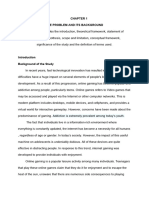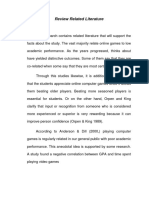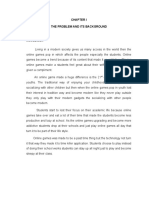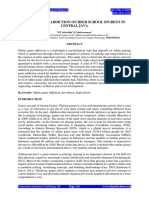0% found this document useful (0 votes)
137 views6 pagesProblem Solution Essay
1) Online gaming addiction has become a widespread issue, particularly among students, as games are readily available online without age restrictions. Spending excessive time gaming can negatively impact physical and mental health as well as academic performance and social relationships.
2) Prevention through parental limits on screen time and increased social interaction is key to addressing gaming addiction. Cognitive behavioral therapy can also be effective by helping people change dysfunctional behaviors and thoughts related to their addiction.
3) While games can be entertaining in moderation, acknowledging the problem of addiction is the first step to treatment through counseling and behavior modification in order to develop a healthy relationship with gaming.
Uploaded by
Angelica VillanuevaCopyright
© © All Rights Reserved
We take content rights seriously. If you suspect this is your content, claim it here.
Available Formats
Download as PDF, TXT or read online on Scribd
0% found this document useful (0 votes)
137 views6 pagesProblem Solution Essay
1) Online gaming addiction has become a widespread issue, particularly among students, as games are readily available online without age restrictions. Spending excessive time gaming can negatively impact physical and mental health as well as academic performance and social relationships.
2) Prevention through parental limits on screen time and increased social interaction is key to addressing gaming addiction. Cognitive behavioral therapy can also be effective by helping people change dysfunctional behaviors and thoughts related to their addiction.
3) While games can be entertaining in moderation, acknowledging the problem of addiction is the first step to treatment through counseling and behavior modification in order to develop a healthy relationship with gaming.
Uploaded by
Angelica VillanuevaCopyright
© © All Rights Reserved
We take content rights seriously. If you suspect this is your content, claim it here.
Available Formats
Download as PDF, TXT or read online on Scribd
/ 6























































































